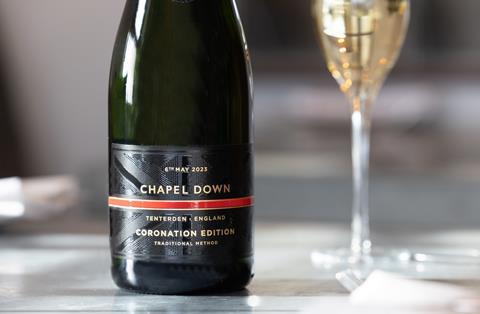
Chapel Down has taken itself off the market after completing a strategic review of its business.
The review, launched by Chapel Down in June, concluded there were “no transactions that would create superior long-term shareholder value” than its current position as “a standalone AIM-listed company”.
“Chapel Down will continue to lead the development and consolidation of the English wine industry and will only consider transactions that are value-creating for our shareholders,” the English winemaker said on Friday (25 October).
The news came alongside a downbeat update on Chapel Down’s harvest and trading performance.
Sparkling wine sales had improved in the third quarter of the year, with stockholdings in the off-trade returning “to normal levels”, Chapel Down said. However there remained “some ongoing pressure on rate of sale in the off-trade”, it added.
Read more: Has the fizz gone out of Chapel Down?
Subsequently, the supplier said it now expected full-year net sales revenues (NSR) to be in low, single-digit decline from the prior year, having previously forecasted for single-digit NSR growth.
The revenue impact, alongside an expected reduction in gross margins owing to “a higher weighting in 2024 towards still wines” meant Chapel Down’s “trading operating profit” would be lower than in 2023, the supplier said.
The 2024 harvest, meanwhile, was “of a high quality” but lower in yield than the five-year average.
As a result, Chapel Down said it would book a non-cash charge of “between £750k and £850k” in FY24 relating to “fair value adjustment on biological assets”.
This, alongside “exceptional costs relating to the strategic review”, meant Chapel Down was now also expecting to report a loss before tax in FY24, it said.
Booking the non-cash charge “in year” would reduce future cost of goods sold and increase future gross margin, it added.
“Chapel Down continues to invest in the leading English wine brand, resulting in continued record levels of brand awareness and brand penetration,” said the winemaker. “These brand metrics and our unrivalled distribution scale underpin our future growth.
“Q4 is the most important trading period for Chapel Down and we have confidence in our success, based on our strong brand and customer marketing support plans. We expect to provide a further scheduled trading update in January.”
Sales revenue net of retro fell by 11%, to £7.1m in the first six months of Chapel Down’s financial year, led by a 36% decline in off-trade sales. Gross profits were down 22% to £3.4m, while profit before tax was down 98% to just £40k.
CEO Andrew Carter is to depart Chapel Down early next year to join Yorkshire brewer Timothy Taylor’s.
Shares in the AIM-listed winemaker were down 18.9% to 38.6p in early afternoon trading on Friday.



















No comments yet